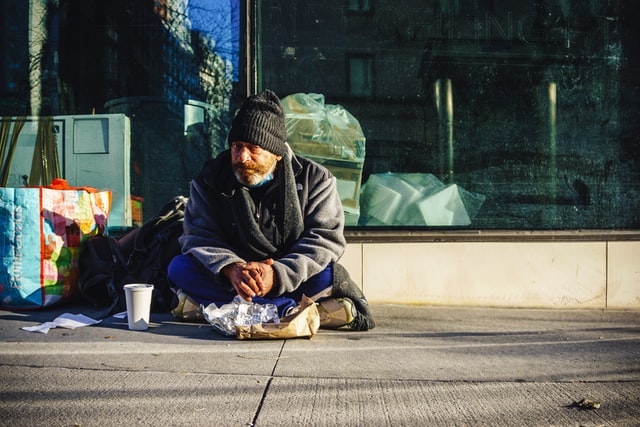-
play_arrow
CRUSADE Channel Previews CRUSADE Preview-Call 844-527-8723 To Subscribe
Who do Americans blame for homelessness?
Via YouGov:
A recent YouGov poll finds that Americans view homelessness as more of a national problem than a local one, though all levels of government – national, state, and local – rank highly on the list of entities Americans blame when it comes to homelessness. The mental health system is the only entity blamed by more Americans among those polled about, which is unsurprising given that the two most cited causes of homelessness (out of a list of 13 options offered) are addiction and mental illness. Solutions that receive the most support (out of 17 options provided) include increasing support for veterans, mental illness, disabilities, and addiction. Among the least supported options to attempt to solve homelessness are banning and criminalizing it.
Homelessness as a national, local, and personal problem
Americans are twice as likely to say homelessness is a very serious problem in the United States (54% say this) as they are to say it’s a very serious problem in their local community (27% say this). People who live in cities are more likely to identify homelessness as a local problem than people who live in suburbs, towns, or rural areas are. People residing in the Western U.S. view homelessness as more of a local problem than people in the Northeast, Midwest, and South do.
While people are more likely to say homelessness is a national rather than a local problem, they are just as likely to endorse national and local government intervention. Most Americans believe the federal government (69%), as well as state and local governments (66%), should be doing more to address homelessness. Unlike concern over homelessness, there are no differences in support for government intervention based on the type of area that people reside in.
For many people, experiences with homelessness are not only local, they are also personal. More than half of Americans (53%) say they know someone who has been homeless (even if only for a short period of time), including themselves, a family member, a friend, or an acquaintance.
Almost one in five Americans (19%) say they have personally been homeless at some point in their lives. Among the groups analyzed that report above-average rates of ever being homeless are:
- 35% of people with an annual family income under $20,000 have ever been homeless
- 34% of people who report their employment status as “permanently disabled”
- 32% of people without a high-school degree
- 32% of people who identify as gay, lesbian, bisexual, or transgender
- 27% of people who have served or are serving in the military
The causes of homelessness
Compared to other causes polled about, Americans are most likely to say that the following are major causes of homelessness in the United States:
- Drug and alcohol addiction (66% say it is a major cause of homelessness; 20% say it is a minor cause)
- Mental illness (60% say major cause; 26%, minor cause)
- Poverty (58% major cause; 25% minor cause)
- Lack of affordable housing (57% major cause; 24% minor cause)
Americans are most likely to say the following are not causesof homelessness:
- Racism (32% say it is not a cause of homelessness)
- Lack of jobs (23% say not a cause)
- Gentrification (17% say not a cause)
- Lack of housing supply (16% say not a cause)
Democrats and Republicans disagree on some potential causes of homelessness. Unlike Democrats — who mostly view homelessness as stemming from society-wide issues, such as poverty and a lack of housing supply — Republicans also attribute homelessness to causes that may be classified as individual weaknesses, such as a lack of financial planning or personal responsibility.
Democrats are more likely than Republicans to attribute homelessness to:
- Poverty
- A lack of affordable housing
- A lack of housing supply
- Disabilities
- Poor health
- Domestic violence
- Racism
- Gentrification
Republicans are more likely than Democrats to attribute homelessness to:
- Drug and alcohol addiction
- A lack of personal responsibility
- Poor personal-finance skills
Who to blame for homelessness
Who or what do Americans blame for homelessness? Of 13 causes polled, Americans are most likely to say they blame the following a lot for homelessness:
- The mental-health system (42% blame it a lot for homelessness; 35% blame it a little)
- The federal government (39% blame it a lot; 36%, a little)
- State governments (36% a lot; 39% a little)
- Local governments (31% a lot; 43% a little)
The groups that Americans are most likely to say they don’t blame at allinclude:
- The military (44% don’t blame it at all)
- Non-profits (39% don’t blame at all)
- Billionaires (27% don’t blame at all)
- Real-estate developers (25% don’t blame at all)
When it comes to assigning blame for homelessness, Democrats and Republicans are most likely to point the finger at members of the other party. In addition, Republicans are more likely than Democrats to place blame on homeless people themselves, while Democrats are more likely to blame billionaires, real estate developers, and landlords.
Democrats are more likely than Republicans to say they blame the following for homelessness:
- Republicans
- Billionaires
- Real estate developers
- Landlords
- The military
Republicans are more likely than Democrats to say they blame the following for homelessness:
- Democrats
- Homeless people themselves
Support for government intervention
Nearly three in four Americans view housing as a basic human right, and when asked which comes closer to their view, Americans are three times as likely to believe the government can do a lot about homelessness (63% believe this) than to believe homelessness is beyond the government’s control (19%).
Since the 1990s, U.S. government policy on homelessness has shifted to a “housing first” model, which offers people who are homeless permanent housing as quickly as possible, and other supportive services thereafter. This model is in contrast to a prior philosophy of “housing readiness,” which focuses on addressing other issues that may have led to homelessness prior to securing housing.
When asked which approach they prefer, about half of Americans take a “housing first” stance on homelessness, while fewer – about one-third – say that people who are homeless should solve other problems first before seeking housing. Though Republicans are less likely than Democrats to support a “housing first” approach, members of both parties are more likely to take this position than the alternative “housing readiness” view.
We also asked Americans their opinions on 17 specific policy proposals aimed at addressing homelessness. Of these, Americans are most likely to support the following:
- Funding services for veterans (79% support this)
- Funding counseling programs for mental illness (78% support)
- Funding programs for people with disabilities (75% support)
- Funding rehabilitation programs for people with addiction (74% support)
Among the proposals asked about, Americans are more likely to support than to oppose all but one: arresting the homeless. The proposals with the highest levels of opposition include:
- Arresting people who are homeless (65% oppose this)
- Banning homeless encampments (35% oppose)
- Building architecture that prevents homeless people from sleeping or camping in public spaces (33% oppose)
- Strengthening laws around renters’ rights to reduce evictions (25% oppose)
While Democrats and Republicans are equally likely to support some policy proposals – such as funding services for people with mental illness or victims of domestic violence – they disagree on many others. Republicans are more likely than Democrats to support measures that make life difficult for homeless people, such as banning homeless camps and building defensive architecture. Democrats, on the other hand, are more likely to favor funding social services, offering housing support, and incentivizing the building of new housing.
Democrats are more likely than Republicans to support the government taking the following actions to address homelessness:
- Spending more on social services
- Strengthening laws around renters’ rights to reduce evictions
- Building housing for chronically homeless people to permanently live in
- Funding more subsidized housing programs
- Funding more emergency rental assistance programs
- Incentivizing developers to build more housing
- Incentivizing developers to build more low-income housing
- Reducing zoning regulations to try to increase the supply of housing
- Funding more programs for people with disabilities
Republicans are more likely than Democrats to support the government taking the following actions to address homelessness:
- Banning homeless encampments
- Building architecture that prevents homeless people from sleeping or camping in public spaces
- Arresting homeless people and putting them in jail
- Funding more services for veterans
Read the rest here
Our Readers And Listeners Keep Us In Print & On The Air!
We’ve interviewed hundreds of guests, seen Brother Andre Marie notch his 200th broadcast of Reconquest; The Mike Church Show over 1500 episodes; launched an original LIVE! News Service; written and produced 4 Feature Length original dramas including The Last Confession of Sherlock Holmes and set sail on the coolest radio product ever, the 5 Minute Mysteries series!
Now that you have discovered The Crusade, get30 days for FREE of our premium News-Talk Radio service just head to:
Did you know about homelessness? If you are interested in supporting small business, be sure to check out the official store of the Crusade Channel, the Founders Tradin Post! Not to mention our amazing collection of DVD’s, Cigars, T-Shirts, bumper stickers and other unique selection of items selected by Mike Church!
Written by: LoneRhody
Similar posts
SEARCH
ON AIR

Sermon Sundays
We Don't Work On Sundays
Sermons culled from traditional Catholic priests according to the season.
close-
Recent Posts
RECENT PODCASTS
TRENDING
SEARCH
NOW PLAYING

Sermon Sundays
We Don't Work On Sundays
Sermons culled from traditional Catholic priests according to the season.
closeUpcoming shows
SIGNUP FOR DAILY PROGRAMMING UPDATES
Copyright BlackHat Studios 2026 dba The CRUSADE Channel, All Rights Reserved













Post comments (0)